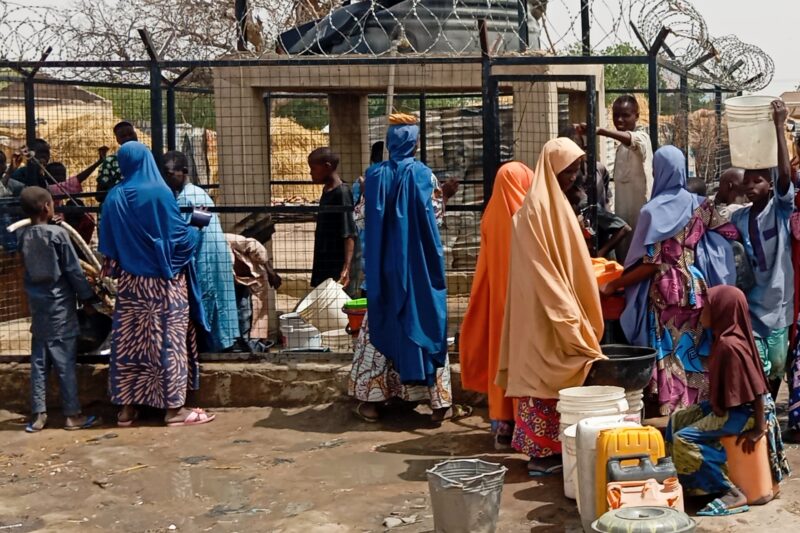In Nigeria’s northeastern Borno State, it is estimated that thousands of women and girls have been brutally sexually violated – by insurgents and even by their ‘rescuers’ – since the start of the conflict in 2009.
For as long as war has existed, sexual violence against women and girls has been used as a weapon of conflict.
In Nigeria’s northeastern Borno State it is estimated that thousands of women and girls have been brutally sexually violated – by insurgents and even by their “rescuers” – since the start of the conflict in 2009.
Hajja Gana Suleiman, the chairperson of Jire Dole, a network of women who have missing relatives and who campaign for justice, spoke to RNI on Wednesday, June 19, the International Day for the Elimination of Sexual Violence in Conflict.
On June 19, 2015, the United Nations Security Council adopted a resolution recognising sexual violence as a weapon of war – the date has been observed since then as a reminder of the brutal abuse of women and girls in conflict areas.
Suleiman said that since the start of the insurgency in Borno State thousands of women and girls had been sexually violated by members of the Jamā’at Ahl as-Sunnah lid-Da’way Wa’l-Jihād (JAS), more commonly referred to as Boko Haram, and the Islamic State West Africa State Province (ISWAP).
Women and girls who escaped or were rescued after being abducted by insurgents said they had been assaulted, raped and impregnated – and many were forced to marry their captors.
But the sexual violence did not end there, Suleiman said, women and girls had reported being raped and sexually abused by Nigerian soldiers while in detention centres. Some were assaulted by security operatives after they had been “rescued”.
“The ongoing conflict has led to widespread displacement. Displaced women and girls are at greater risk of sexual violence.
“Poverty, deprivation and the collapse of family structures have resulted in ‘sex-for-food’, particularly in camps for internally displaced persons [IDPs] and host communities.”
A “crisis of masculinity” had developed among men who were accustomed to providing for their families but who now lived in IDP camps and depended on the goodwill of others to survive. This had resulted in increased levels of domestic violence, Suleiman said.
“There is a silence surrounding sexual violence that makes it difficult to investigate and prosecute.
“The shame and stigma prevent women and girls from reporting sexual violence and this makes it difficult to accurately assess the full extent of the scourge.
“Victims – whom we refer to as survivors – feel pressured to preserve individual and family dignity and they fear their marriage prospects will be compromised if they report their abuse.
“The psychological effects include trauma, mental illness, flashbacks and nightmares, and drug addiction. Social stigma, dislocation and rejection by communities and families impede survivors’ ability to function normally.”
Suleiman said “just about everyone” in Borno State had been affected to some degree by the conflict.
“The government needs to ensure that women and girls are able to access psychosocial and mental health support. Sexual assault referral centres and mechanisms need to be established where women and girls will feel safe to talk about their abuse and where they will get the help they need.
“The state needs to review the legal framework and policies to ensure perpetrators are punished.
“All critical stakeholders – such as the government, parents, traditional leaders, the media, non-governmental organisations and women’s groups – have a vital role to play in eliminating sexual violence against women.
“Survivors must be protected so that they feel free to report violations. The state needs to engage in strong awareness campaigns and improve humanitarian response mechanisms. There needs to be a shift in the way survivors are perceived.
“Women and girls must be encouraged to report all forms of abuse. But they will not report abuse if they are frightened of the repercussions. The government must ensure that survivors and witnesses are protected.”
Aisha Indimi, the gender desk officer at the Borno State Ministry of Education, said it was the responsibility of parents to report cases of sexual violence against their daughters.
“All forms of gender-based violence, including domestic abuse, and sexual abuse perpetrated by security operatives or insurgents, must be reported. If left unreported, it can ruin the victim’s future. There will be no justice because the culprit will go unpunished. The psychological damage can last a lifetime.
“On this International Day for the Elimination of Sexual Violence in Conflict, let us join hands and make a pledge to eliminate this scourge and stand in solidarity with survivors.”
A young woman, who asked to remain anonymous, said she had been with a group of women collecting firewood when they were abducted by insurgents. She was 15 at the time. She managed to escape from captivity with her two children and is now living in an IDP camp in Maiduguri.
“When I arrived at the camp, the people here treated me with disdain. They did not want to have anything to do with me because I had been with Boko Haram. They did not believe me when I told them I had been forced to marry an insurgent. They kept asking me when I would go back to him.
“I asked a man in the camp to help me but he said he would only do so if I had sex with him. I refused but he physically forced me.
“I have been living in the camp for two years. Sometimes, just to provide food for my children, I have been forced to have sex with men.
“Some of the women have taken pity on me and they have helped me. But I still feel like an outsider. The people here treat me differently. It is hard for my children because some of the kids make fun of them because their father is an insurgent.
“Life in the camp is a constant struggle because the living conditions are precarious.”
SHETTIMA LAWAN MONGUNO









